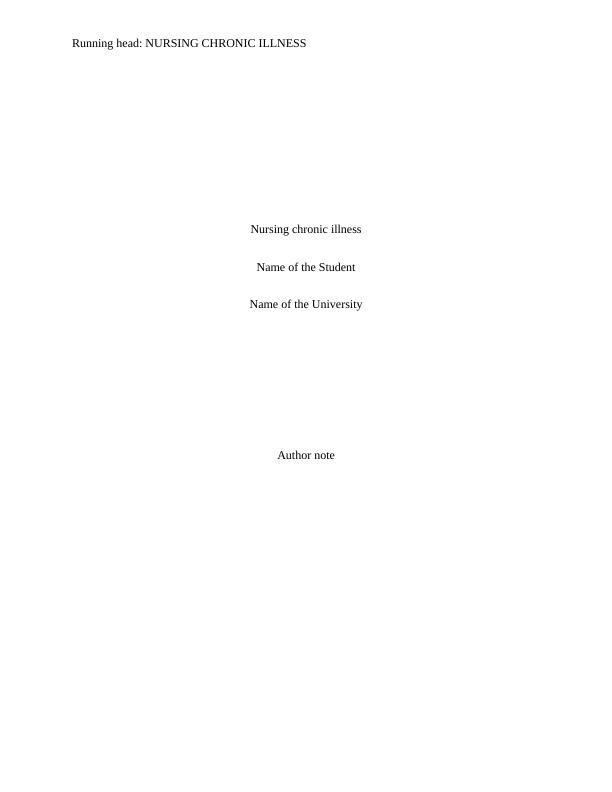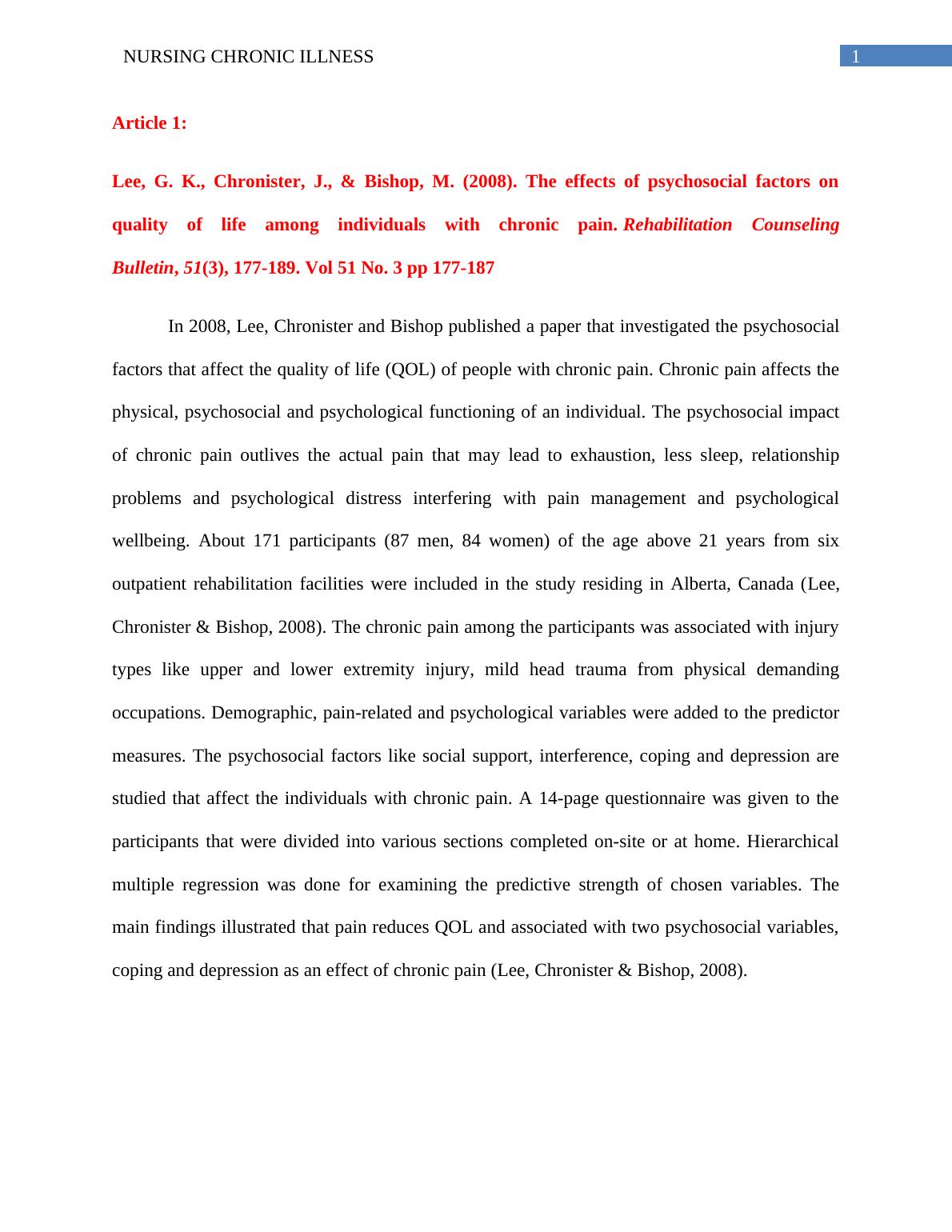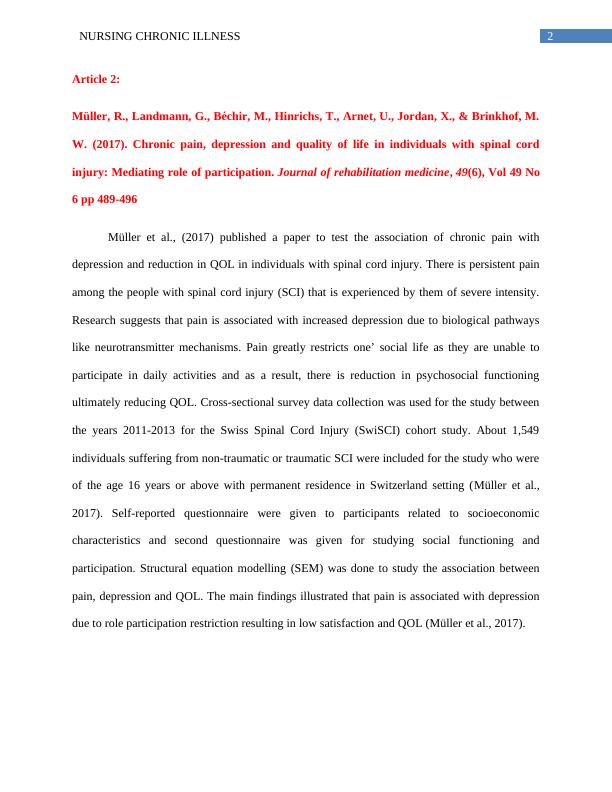The effects of psychosocial factors on quality of life among individuals with chronic pain
Added on 2021-04-24
7 Pages1524 Words380 Views
Running head: NURSING CHRONIC ILLNESSNursing chronic illnessName of the StudentName of the UniversityAuthor note

1NURSING CHRONIC ILLNESSArticle 1: Lee, G. K., Chronister, J., & Bishop, M. (2008). The effects of psychosocial factors onquality of life among individuals with chronic pain.Rehabilitation CounselingBulletin,51(3), 177-189. Vol 51 No. 3 pp 177-187In 2008, Lee, Chronister and Bishop published a paper that investigated the psychosocialfactors that affect the quality of life (QOL) of people with chronic pain. Chronic pain affects thephysical, psychosocial and psychological functioning of an individual. The psychosocial impactof chronic pain outlives the actual pain that may lead to exhaustion, less sleep, relationshipproblems and psychological distress interfering with pain management and psychologicalwellbeing. About 171 participants (87 men, 84 women) of the age above 21 years from sixoutpatient rehabilitation facilities were included in the study residing in Alberta, Canada (Lee,Chronister & Bishop, 2008). The chronic pain among the participants was associated with injurytypes like upper and lower extremity injury, mild head trauma from physical demandingoccupations. Demographic, pain-related and psychological variables were added to the predictormeasures. The psychosocial factors like social support, interference, coping and depression arestudied that affect the individuals with chronic pain. A 14-page questionnaire was given to theparticipants that were divided into various sections completed on-site or at home. Hierarchicalmultiple regression was done for examining the predictive strength of chosen variables. Themain findings illustrated that pain reduces QOL and associated with two psychosocial variables,coping and depression as an effect of chronic pain (Lee, Chronister & Bishop, 2008).

2NURSING CHRONIC ILLNESSArticle 2: Müller, R., Landmann, G., Béchir, M., Hinrichs, T., Arnet, U., Jordan, X., & Brinkhof, M.W. (2017). Chronic pain, depression and quality of life in individuals with spinal cordinjury: Mediating role of participation.Journal of rehabilitation medicine,49(6), Vol 49 No6 pp 489-496 Müller et al., (2017) published a paper to test the association of chronic pain withdepression and reduction in QOL in individuals with spinal cord injury. There is persistent painamong the people with spinal cord injury (SCI) that is experienced by them of severe intensity.Research suggests that pain is associated with increased depression due to biological pathwayslike neurotransmitter mechanisms. Pain greatly restricts one’ social life as they are unable toparticipate in daily activities and as a result, there is reduction in psychosocial functioningultimately reducing QOL. Cross-sectional survey data collection was used for the study betweenthe years 2011-2013 for the Swiss Spinal Cord Injury (SwiSCI) cohort study. About 1,549individuals suffering from non-traumatic or traumatic SCI were included for the study who wereof the age 16 years or above with permanent residence in Switzerland setting (Müller et al.,2017). Self-reported questionnaire were given to participants related to socioeconomiccharacteristics and second questionnaire was given for studying social functioning andparticipation. Structural equation modelling (SEM) was done to study the association betweenpain, depression and QOL. The main findings illustrated that pain is associated with depressiondue to role participation restriction resulting in low satisfaction and QOL (Müller et al., 2017).

End of preview
Want to access all the pages? Upload your documents or become a member.
